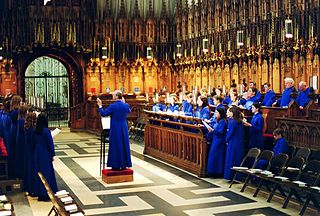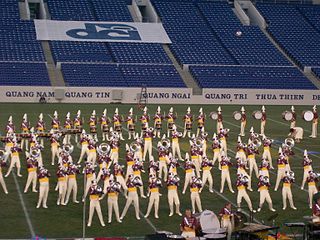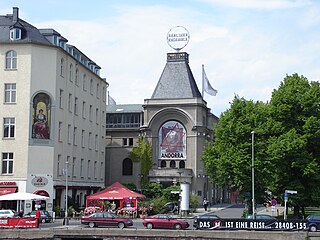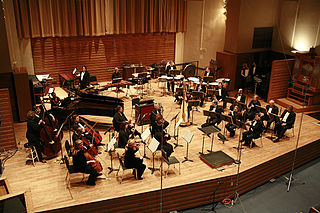Related Research Articles

An orchestra is a large instrumental ensemble typical of classical music, which combines instruments from different families. There are typically four main sections of instruments:

A choir is a musical ensemble of singers. Choral music, in turn, is the music written specifically for such an ensemble to perform or in other words is the music performed by the ensemble. Choirs may perform music from the classical music repertoire, which spans from the medieval era to the present, or popular music repertoire. Most choirs are led by a conductor, who leads the performances with arm, hand, and facial gestures.

A modern drum and bugle corps is a musical marching unit consisting of brass instruments, percussion instruments, electronic instruments, and color guard. Typically operating as independent non-profit organizations, corps perform in competitions, parades, festivals, and other civic functions. Participants of all ages are represented within the corps activity, but the majority are between the ages of 13 and 22 and are members of corps within Drum Corps International.

A film score is original music written specifically to accompany a film. The score comprises a number of orchestral, instrumental, or choral pieces called cues, which are timed to begin and end at specific points during the film in order to enhance the dramatic narrative and the emotional impact of the scene in question. Scores are written by one or more composers under the guidance of or in collaboration with the film's director or producer and are then most often performed by an ensemble of musicians – usually including an orchestra or band, instrumental soloists, and choir or vocalists – known as playback singers – and recorded by a sound engineer. The term is less frequently applied to music written for media such as live theatre, television and radio programs, and video games, and said music is typically referred to as either the soundtrack or incidental music.

Conducting is the art of directing a musical performance, such as an orchestral or choral concert. It has been defined as "the art of directing the simultaneous performance of several players or singers by the use of gesture." The primary duties of the conductor are to interpret the score in a way that reflects the specific indications in that score, set the tempo, ensure correct entries by ensemble members, and "shape" the phrasing where appropriate. Conductors communicate with their musicians primarily through hand gestures, usually with the aid of a baton, and may use other gestures or signals such as facial expression and eye contact. A conductor usually supplements their direction with verbal instructions to their musicians in rehearsal.

A concert band, also called a wind band, wind ensemble, wind symphony, wind orchestra, symphonic band, the symphonic winds, or symphonic wind ensemble, is a performing ensemble consisting of members of the woodwind, brass, and percussion families of instruments, and occasionally including the harp, double bass, or bass guitar. On rare occasions, additional, non-traditional instruments may be added to such ensembles such as piano, synthesizer, or electric guitar.
The Rotterdam Philharmonic Orchestra is a Dutch symphony orchestra based in Rotterdam. Its primary venue is the concert hall De Doelen. The RPhO is considered one of the Netherlands' two principal orchestras of international standing, second to the Royal Concertgebouw Orchestra of Amsterdam. In addition to symphony concerts, the RPhO performs as the opera orchestra in productions at De Nederlandse Opera, as do other Dutch ensembles.
A music director, musical director or director of music is the person responsible for the musical aspects of a performance, production, or organization. This would include the artistic director and usually chief conductor of an orchestra or concert band, the director of music of a film, the director of music at a radio station, the person in charge of musical activities or the head of the music department in a school, the coordinator of the musical ensembles in a university, college, or institution, the head bandmaster of a military band, the head organist and choirmaster of a church, or an organist and master of the choristers.
Sound design is the art and practice of creating soundtracks for a variety of needs. It involves specifying, acquiring or creating auditory elements using audio production techniques and tools. It is employed in a variety of disciplines including filmmaking, television production, video game development, theatre, sound recording and reproduction, live performance, sound art, post-production, radio, new media and musical instrument development. Sound design commonly involves performing and editing of previously composed or recorded audio, such as sound effects and dialogue for the purposes of the medium, but it can also involve creating sounds from scratch through synthesizers. A sound designer is one who practices sound design.
An artistic director is the executive of an arts organization, particularly in a theatre company or dance company, who handles the organization's artistic direction. They are generally a producer and director, but not in the sense of a mogul, since the organization is generally a non-profit organization. The artistic director of a theatre company is the individual with the overarching artistic control of the theatre's production choices, directorial choices, and overall artistic vision. In smaller theatres, the artistic director may be the founder of the theatre and the primary director of its plays. In larger non-profit theatres, the artistic director may be appointed by the board of directors.
A creative director is a person who makes high-level creative decisions; oversees the creation of creative assets such as advertisements, products, events, or logos ; and directs & translates the creative peoples who produce the end results. Creative director positions are often found within the television production, graphic design, film, music, video game, fashion, advertising, media, or entertainment industries, but may be found in other creative organizations such as web development and software development firms as well.

A rehearsal is an activity in the performing arts that occurs as preparation for a performance in music, theatre, dance and related arts, such as opera, musical theatre and film production. It is undertaken as a form of practising, to ensure that all details of the subsequent performance are adequately prepared and coordinated. The term rehearsal typically refers to ensemble activities undertaken by a group of people. For example, when a musician is preparing a piano concerto in their music studio, this is called practising, but when they practice it with an orchestra, this is called a rehearsal. The music rehearsal takes place in a music rehearsal space.

The Berliner Ensemble is a German theatre company established by actress Helene Weigel and her husband, playwright Bertolt Brecht, in January 1949 in East Berlin. In the time after Brecht's exile, the company first worked at Wolfgang Langhoff's Deutsches Theater and in 1954 moved to the Theater am Schiffbauerdamm, built in 1892, that was open for the 1928 premiere of The Threepenny Opera.

Frieda Belinfante was a Dutch cellist, philharmonic conductor, a prominent lesbian, and a member of the Dutch resistance during World War II. After the war, Belinfante emigrated to the United States and continued her career in music. She was the founding artistic director and conductor of the Orange County Philharmonic.

The San Antonio Symphony was a full-time professional symphony orchestra based in San Antonio, Texas. Its season ran from late September to early June. Sebastian Lang-Lessing, its music director from 2010 to 2020, was the last to serve in that capacity. The orchestra was a resident organization of the Tobin Center for the Performing Arts in San Antonio. In August 2022, the orchestra's musicians reformed as the San Antonio Philharmonic, a name first used in 1914, and announced a ten-concert classical-music series for the 2022–23 season to be given at First Baptist Church of San Antonio, 100 yards from Tobin Center.

The conductorless orchestra, sometimes referred to as a self-conducted orchestra or unconducted orchestra, is an instrumental ensemble that functions as an orchestra but is not led or directed by a conductor. Most conductorless orchestras are smaller in size, and generally perform chamber orchestra repertoire. Several conductorless orchestras are made up of only strings and focus primarily on string orchestra repertoire. Conductorless orchestras generally come from the classical music tradition and perform standard repertoire, but many conductorless orchestras promote or specialise in contemporary classical music repertoire. Many contemporary classical music ensembles also regularly perform without a conductor.
Gil Rose is the founder and conductor of the Boston Modern Orchestra Project (BMOP), founder and General-Artistic Director of Odyssey Opera, Artistic Director of Monadnock Music Festival, Professor of Practice at Northeastern University, and Executive Producer of the record label "BMOP/sound."
Ensemble librarianship is an area of music librarianship which specializes in serving the needs of musical ensembles, including symphony and chamber orchestras, opera houses, ballet companies, wind ensembles and educational institutions. Ensemble librarians acquire printed music and prepare it for performance.
Eric Jacobsen is an American conductor and cellist. He is currently a member of The Knights, and the Silk Road Project, and is the Music Director of the Orlando Philharmonic Orchestra and Virginia Symphony Orchestra, Principal Conductor of the Greater Bridgeport Symphony, and when was an artistic partner of the Northwest Sinfonietta from 2015-2018

Israeli military ensembles are artistic ensembles and military bands maintained by the Israel Defense Forces, which are the combined military forces of the State of Israel. There are two types of musical ensembles in the IDF: Military bands and Entertainment troupes. Military bands provide martial music during official events of state and military ceremonies. Entertainment troupes conduct public in theatrical settings, most notably in musicals. They usually consist of musicians and singers who have passed auditions prior to their enlistment for compulsory service.
References
- 1 2 "Chiefs and Directors – ConductIT" . Retrieved 2024-04-25.